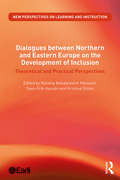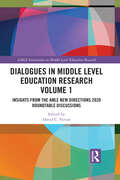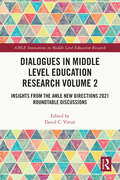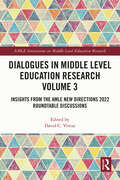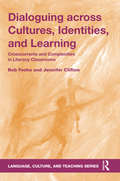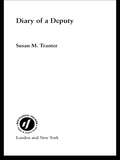- Table View
- List View
Dialogues Concerning Natural Religion (SparkNotes Philosophy Guide)
by SparkNotesDialogues Concerning Natural Religion (SparkNotes Philosophy Guide) Making the reading experience fun! SparkNotes Philosophy Guides are one-stop guides to the great works of philosophy–masterpieces that stand at the foundations of Western thought. Inside each Philosophy Guide you&’ll find insightful overviews of great philosophical works of the Western world.
Dialogues between Northern and Eastern Europe on the Development of Inclusion: Theoretical and Practical Perspectives (New Perspectives on Learning and Instruction)
by Natallia Bahdanovich HanssenThe concepts of inclusion and inclusive education for children with special education needs (SEN) have been widely accepted as imperative undertakings in the education spectrum. This book posits the practice of these ideas by scrutinizing the methodologies adopted by varied nations of the two regions towards inclusive education along with juxtaposing the dichotomous observations to enable a dialogue regarding the actualization of inclusive education. The book looks at the distinct approaches taken by Northern and Eastern European education systems to realize inclusive education for children with SEN and aims to enable a space for dialogue wherein the reader would be able to access the cultural context of each practice, expand their cognizance regarding the concept of inclusivity and develop a more nuanced and sensitive approach to inclusive education. In the act of exploring the myriad ways in which inclusivity is practiced in the two regions, the book thusly provides insights into the pluralities and significance of inclusion in the education sector across a global spectrum. The anthology will be of interest to a vast range of audience, videlicet, individuals, students, researchers, professionals, et al., invested in the education sector, special needs education and pedagogy. It further proposes appeal for individuals interested in performing scientific research on the subject. The book practically aims to be of interest for any individual invested in the discipline of education, development of community and the topics pertaining to education for children with SEN.
Dialogues in Middle Level Education Research Volume 1: Insights from the AMLE New Directions 2020 Roundtable Discussions (AMLE Innovations in Middle Level Education Research)
by David C. VirtueMirroring the roundtable discussions conducted at the 2020 Association for Middle Level Education (AMLE) conference, this volume highlights the dialogic knowledge-building process critical to advancing middle level teaching and research. Launching the new AMLE Innovations in Middle Level Education Research series, this collection captures the synergetic dialogue that occurs during professional meetings by collating and centering five recent studies on topics such as mathematics achievement, personalized and project-based learning, and teacher collaboration. A companion essay and critical external response accompanies each study, serving to re-situate original research and reconsider findings in view of professional insights and external critique gained through discussion at AMLE 2020. Ultimately, these response essays foreground potential avenues for future research and alternative thinking, laying the groundwork for implementation of critical discussion in the classroom environment. This text will benefit researchers, doctoral students, and academics in the fields of middle level education, educational research, and specifically research methods in education. Those interested in teaching and learning, and adolescent development more broadly, will also benefit from this volume.
Dialogues in Middle Level Education Research Volume 2: Insights from the AMLE New Directions 2021 Roundtable Discussions (AMLE Innovations in Middle Level Education Research)
by David C. VirtueThis book echoes and enhances the generative, dialogic, knowledge-building process that took place at the AMLE 2021 conference, reflecting the way in which middle-level researchers work collaboratively and draw ideas and inspiration for their studies from prior research and accounts of practice, as well as their own experiences in the field. Each of the five sections features a recent study presented at the roundtable session at the 2021 AMLE conference, accompanied by two companion pieces offering different perspectives on the work. In the latter, the authors enrich and extend the original research by incorporating feedback from the conference session discussions, revisiting their findings and conclusions, considering alternative approaches to further research, and proposing new or clarified implications for practice. Addressing themes across theoretical frameworks and diversity of research design, and with topics ranging from music education to teacher agency and the productive struggle, the volume crucially presents and discusses recent innovations in the field with a view to prompting future research questions and deeper inquiry. As such, it will benefit researchers, doctoral students, and academics in the fields of middle level education, educational research, and specifically research methods in education. Those interested in teaching and learning, and adolescent development more broadly will also benefit from this volume.
Dialogues in Middle Level Education Research Volume 3: Insights from the AMLE New Directions 2022 Roundtable Discussions (AMLE Innovations in Middle Level Education Research)
by David C. VirtueThis insightful book presents and discusses the dialogues that took place in the New Directions in Middle Level Education Research session at the 2022 Association for Middle Level Education (AMLE) conference. Carefully crafted and expert-led chapters draw upon four recent studies that were published in Research in Middle Level Education Online, the research journal of AMLE, and which were featured in a roundtable discussion at the 2022 AMLE conference. Each section of the book includes one of the four studies accompanied by two companion pieces offering different perspectives on the work. In the companion essays, the original authors enrich and extend their research by incorporating feedback from the conference session discussions, revisiting their findings and conclusions, considering alternative approaches to further research, and proposing new or clarified implications for practice. The book also comprises contributions from middle level education experts, who offer responses to each study, offering perspectives, critiques, and commentaries. Reflecting the generative, dialogic, knowledge-building process that took place at the AMLE conference, it showcases the collaborative work of middle level researchers who draw ideas and inspiration for their studies from prior research and accounts of practice, as well as their own experiences in the field. This book is an excellent resource for researchers, doctoral students, and academics in the fields of middle level education, educational research, and research methods in education.
Dialoguing across Cultures, Identities, and Learning: Crosscurrents and Complexities in Literacy Classrooms (Language, Culture, and Teaching Series)
by Bob Fecho Jennifer CliftonDrawing on Dialogical Self Theory, this book presents a new framework for social and cultural identity construction in the literacy classroom, offering possibilities for how teachers might adjust their pedagogy to better support the range of cultural stances present in all classrooms. In the complex multicultural/multiethnic/multilingual contexts of learning in and out of school spaces today, students and teachers are constantly dialoguing across cultures, both internally and externally, and these cultures are in dialogue with each other. The authors unpack some of the complexity of culture and identity, what people do with culture and identity, and how people navigate multiple cultures and identities. Readers are invited to re-examine how they view different cultures and the roles these play in their lives, and to dialogue with the authors about cultures, learning, literacy, identity, and agency.
Diaminds
by Mihnea Moldoveanu Roger L. MartinWhat constitutes successful thinking in business? What are some of the techniques used by top business minds in order to solve problems and create value? Diaminds breaks new ground in addressing these questions.Mihnea Moldoveanu and Roger Martin, creators of the Integrative Thinking curriculum at the Rotman School of Management, draw upon case studies and interviews - as well as theories and models from cognitive psychology, epistemology, analytic philosophy, and semiotics - to offer a new conception of successful intelligence that is immediately applicable to business situations. The 'diamind' (or dialogical mind) is characterized by bi-stability (simultaneously holding opposite plans, models, courses of action in mind while retaining the ability to act), meliorism (increasing the logical depth and informational breadth of one's thinking processes), choicefulness (retaining the ability to choose among various representations of the world, the self and others) and polyphony (thinking about the way one formulates and solves a problem while at the same time thinking about the problem itself). End-of-chapter exercises encourage readers to examine and re-engineer their own thought and perception patterns to develop these qualities and cultivate their own 'diaminds.'
Diamond Willow
by Helen FrostIn a remote area of Alaska, twelve-year-old Willow helps her father with their sled dogs when she is not at school, wishing she were more popular, all the while unaware that the animals surrounding her carry the spirits of ancestors who care for her.
Diamonds Are for Evil (Skateboard Detectives #3)
by Andrew Fusek PetersThe Skateboard Detectives are on the trail of a missing diamond, but they're not the only ones. It's going to take some tight moves and death-defying free-running to keep one step ahead of the ruthless jewel-thieves...
Diario de Sofía desde el cuarto de baño de chicas
by Rose CooperUna chica que pasa desapercibida en la escuela decide que quiere ser popular. Para lograrlo creará un blog donde pondrá información sobre todo lo que ocurre en su colegio. Ahora la protagonista del diario es chica y se llama Sofía. Empezar el instituto puede ser muy duro, sobre todo si no eres popular. Sofía lo sabe y se ha puesto a escribir el mejor blog del mundo. Espiando en el cuarto de baño de chicas, toma notas en su diario de todo lo que ocurre en los cambios de clase. Así consigue que su blog sea leído por todo el mundo, pero conseguir la popularidad no es tarea fácil y a veces tendrá que tomar decisiones que afecten a sus seres queridos.
Diario de la gratitud: Dos simples minutos de llevar un diario
by Brian GugasDos simples minutos de llevar un diario, sugerencias semanales, inspiraciones mensuales. No sería genial para todos los involucrados si decidieras enfocarte en la vida con una actitud de gratitud Puedes imaginarte cuan más agradable y productivo serias si decides concentrarte en lo positivo de tu vida en vez de lo negativo
Diario de sueños
by Martina D'AntiochiaDescubre los secretos de los sueños... ¡Los de Martina y los tuyos! Tienes entre tus manos un libro lleno de secretos y de todo lo que siempre has querido saber sobre los sueños: lo que significan, qué dicen de ti, de tus miedos, de tus deseos... ¡Y con mucho espacio para que puedas escribir todo lo que te pasa por la cabeza de noche! Cierra los ojos, ¡y atrévete a soñar!
Diario de una Lechuza #7: Un libro de la serie Branches (Diario de una lechuza #7)
by Rebecca ElliottEva and her friends are opening a bakery!Pick a book. Grow a Reader!¡La version en espanol de The Wildwood Bakery!Maria, la amiga de Eva, tiene una hermanita que no puede volar, asi que la clase de Eva decide reunir dinero para comprarle una silla voladora super chevere. Una parte de la clase abre una pasteleria para reunir el dinero, y la otra parte abre una tienda de dulces. Ambos grupos compiten por ver quien reune mas dinero, pero a la larga tendran que trabajar juntos para lograrlo. ¿Podra Eva hacer que todos trabajen en equipo?Eva's friend Macy has a little sister who can't fly on her own. So Eva's class decides to raise money to buy her a super-cool flying chair! Half of the class opens a bakery to raise the money. The other half opens a candy store. Soon the owls are competing to see whose shop can make the most money. But they will all need to work together to raise enough money for the special chair. Can Eva get everyone to work as a team?
Diario de una Súper Chica - Libro 1 - Los Altibajos de ser Súper (Diario de una Súper Chica #1)
by Katrina Kahler María Florencia Lavorato John ZakourLibros para niñas entre 9 y 12: Lia Strong siempre se vio a sí misma como una chica normal de 12 años, que se enfrenta cotidianamente a los altibajos de la escuela media. Tú sabes cómo es…juntarse con amigos, ir a práctica de LAX, enormes cantidades de tarea y tener que lidiar con las chicas malas. Pero al cumplir 13, ¡todo cambió! En su cumpleaños número 13, se enteró de una noticia muy especial... es la última de una larga línea de súper mujeres. Parece ser una chica normal, a excepción de una cosa… sus súper poderes. Por un lado, tiene la fuerza de 100 personas, pero por el otro, sus gases ¡tienen el potencial de noquear a 100 personas! Oh, ¡las vicisitudes de tener súper poderes! Un libro perfecto para niñas que aman a los personajes femeninos fuertes. ¡Te va a encantar!
Diario del Sig. Alto, Misterioso e Affascinante La Mia Vita È Cambiata - Libro 1
by Kaz Campbell Silvia Gallico & Marco GallicoIl Sig. Alto, Misterioso e Affascinante (Sig. AMA in breve)… Richard Jones deve questo soprannome a Maddi Bull. Leggi il diario di Richard e scopri cosa pensa di tutto quello che succede nella sua vita e che cosa pensa di Maddi. A volte, la vita può essere difficile, soprattutto se si ha recentemente perso la mamma in un incidente d’auto. Ma Maddi riporta il sorriso sul viso del Sig. AMA. E poi c'è l’orologio. Richard scopre l'orologio da tasca della sua mamma, un antico cimelio di famiglia che è stato tramandato di generazione in generazione. La nonna gli aveva raccontato molte storie sulle avventure da lei vissute. Potevano quelle storie essere vere? E poteva quell’orologio da tasca aver qualcosa a che fare con queste storie? Cosa farà Richard? Deciderà di esplorare e vivere mille avventure o seguirà il consiglio di suo padre di ignorare quelle storie inverosimili? Un libro perfetto per giovani ragazze fra i 9 e i 12 anni.
Diario di una Super Girl Libro 1 Alti e bassi dell’essere Super
by Loredana Marmorale Katrina Kahler and John ZakourLia ha sempre pensato di essere una dodicenne come le altre. La sua vita è fatta dei tipici alti e bassi della sua età: gli amici, gli allenamenti di lacrosse, una valanga di compiti, le bulle della scuola. Ma le cose stanno per cambiare! Alla vigilia del suo tredicesimo compleanno, Lia fa infatti una scoperta sensazionale: è l’ultima di una stirpe di super donne. All’apparenza sembra una ragazzina normale, simile in tutto e per tutto alle sue coetanee, in realtà è dotata di straordinari superpoteri, che si manifesteranno proprio appena compirà i fatidici 13 anni! Il lato positivo di questi SUPERPOTERI è avere la forza di cento persone, il lato negativo è… Venite a scoprirlo! Libro per ragazze, età 9-12 anni
Diario di una ragazza quasi popolare - Libro 2 - La mia nuova scuola
by B Campbell Erica Roggio e Linda RoggioUna nuova scuola…un nuovo inizio. Beh, almeno questo è ciò che spera Madonna. Maddy è una ragazza “normale”, più o meno. Non fa parte del gruppetto delle ragazze popolari, ma non è neanche una secchiona. È una via di mezzo e cerca di adattarsi. Segui le sue esilaranti avventure nella nuova scuola. Scommetto che potrebbero capitare anche a te! Questo libro è adatto a ragazze e ragazzi tra i 7 e i 12 anni. Racconta di una ragazza che è “quasi popolare”, carina, forte e decisamente spiritosa.
Diary Days
by Ghillian PottsYasmin has a problem. Her cat's just had six kittens and Mum says Yasmin can't keep them. If she doesn't find homes for them they'll have to go to the Cat Protection home! Mr Williams has asked the class to write a diary so Yasmin writes down all her worries. Will Yasmin be able to find the courage to stand up in front of the class to ask for help with the kittens before it's too late
Diary of A Deputy
by Susan M. TranterFirst Published in 2004. Routledge is an imprint of Taylor & Francis, an informa company.
Diary of a Parent Trainer
by Jennifer SmithMeet Katie Sutton. She may just look like your average thirteen-year-old girl but in reality, she's the world's leading expert in Grown Up behavior. And you're in luck because in your hands you hold a one-of-a-kind guide to training your parent and becoming highly skilled at: understanding their insane behavior, predicting their next moves, and operating them to your best advantage. So please keep this book out of the way of your grown up, we don't want them going into "grumpy mode" too soon.From the Hardcover edition.
Diary of a Wimpy Kid (Diary of a Wimpy Kid #1)
by Jeff KinneyBoys don't keep diaries--or do they? <P><P>The launch of an exciting and innovatively illustrated new series narrated by an unforgettable kid every family can relate to It's a new school year, and Greg Heffley finds himself thrust into middle school, where undersized weaklings share the hallways with kids who are taller, meaner, and already shaving. The hazards of growing up before you're ready are uniquely revealed through words and drawings as Greg records them in his diary. <P>In book one of this debut series, Greg is happy to have Rowley, his sidekick, along for the ride. But when Rowley's star starts to rise, Greg tries to use his best friend's newfound popularity to his own advantage, kicking off a chain of events that will test their friendship in hilarious fashion. <P>Author/illustrator Jeff Kinney recalls the growing pains of school life and introduces a new kind of hero who epitomizes the challenges of being a kid. <P>As Greg says in his diary, "Just don't expect me to be all 'Dear Diary' this and 'Dear Diary' that." Luckily for us, what Greg Heffley says he won't do and what he actually does are two very different things.
Diary of a Wimpy Kid (Diary of a Wimpy Kid #1)
by Jeff KinneyBoys don't keep diaries--or do they? <P><P>The launch of an exciting and innovatively illustrated new series narrated by an unforgettable kid every family can relate to It's a new school year, and Greg Heffley finds himself thrust into middle school, where undersized weaklings share the hallways with kids who are taller, meaner, and already shaving. The hazards of growing up before you're ready are uniquely revealed through words and drawings as Greg records them in his diary. <P>In book one of this debut series, Greg is happy to have Rowley, his sidekick, along for the ride. But when Rowley's star starts to rise, Greg tries to use his best friend's newfound popularity to his own advantage, kicking off a chain of events that will test their friendship in hilarious fashion. <P>Author/illustrator Jeff Kinney recalls the growing pains of school life and introduces a new kind of hero who epitomizes the challenges of being a kid. <P>As Greg says in his diary, "Just don't expect me to be all 'Dear Diary' this and 'Dear Diary' that." Luckily for us, what Greg Heffley says he won't do and what he actually does are two very different things.
Diary of a Wimpy Kid (Diary of a Wimpy Kid #1)
by Jeff KinneyGreg records his experiences in a middle school where he and his best friend, Rowley, undersized weaklings amid boys who need to shave twice daily, hope just to survive, but when Rowley grows more popular Greg must take drastic measures to save their friendship.
Diary of a Worm: Nat the Gnat (I Can Read Level 1)
by Doreen CroninWorm is thrilled when it's his turn to take care of the class pet, Nat the Gnat. But everything goes wrong when he leaves the lid of Nat's tank open. Can Worm make sure the class pet returns safe and sound before Mrs. Mulch finds out? This all-new, original I Can Read story captures the fun of the #1 New York Times bestselling Diary of a Worm picture book series by Doreen Cronin and Harry Bliss, and will leave beginning readers wiggling for more!This Level 1 I Can Read book is perfect for children learning to sound out words and sentences.
Diary of a Worm: Teacher's Pet (I Can Read Level 1)
by Doreen CroninWorm is all about having fun, respecting the earth, and never taking baths. Many children will relate to this funny character! In Diary of a Worm: Teacher's Pet, Worm makes a surprising discovery—teachers have birthdays. That means Worm and his friends have to find the perfect present for their teacher, Mrs. Mulch. Diary of a Worm: Teacher's Pet is a Level One I Can Read book, which means it is perfect for kids learning to sound out words and sentences.

